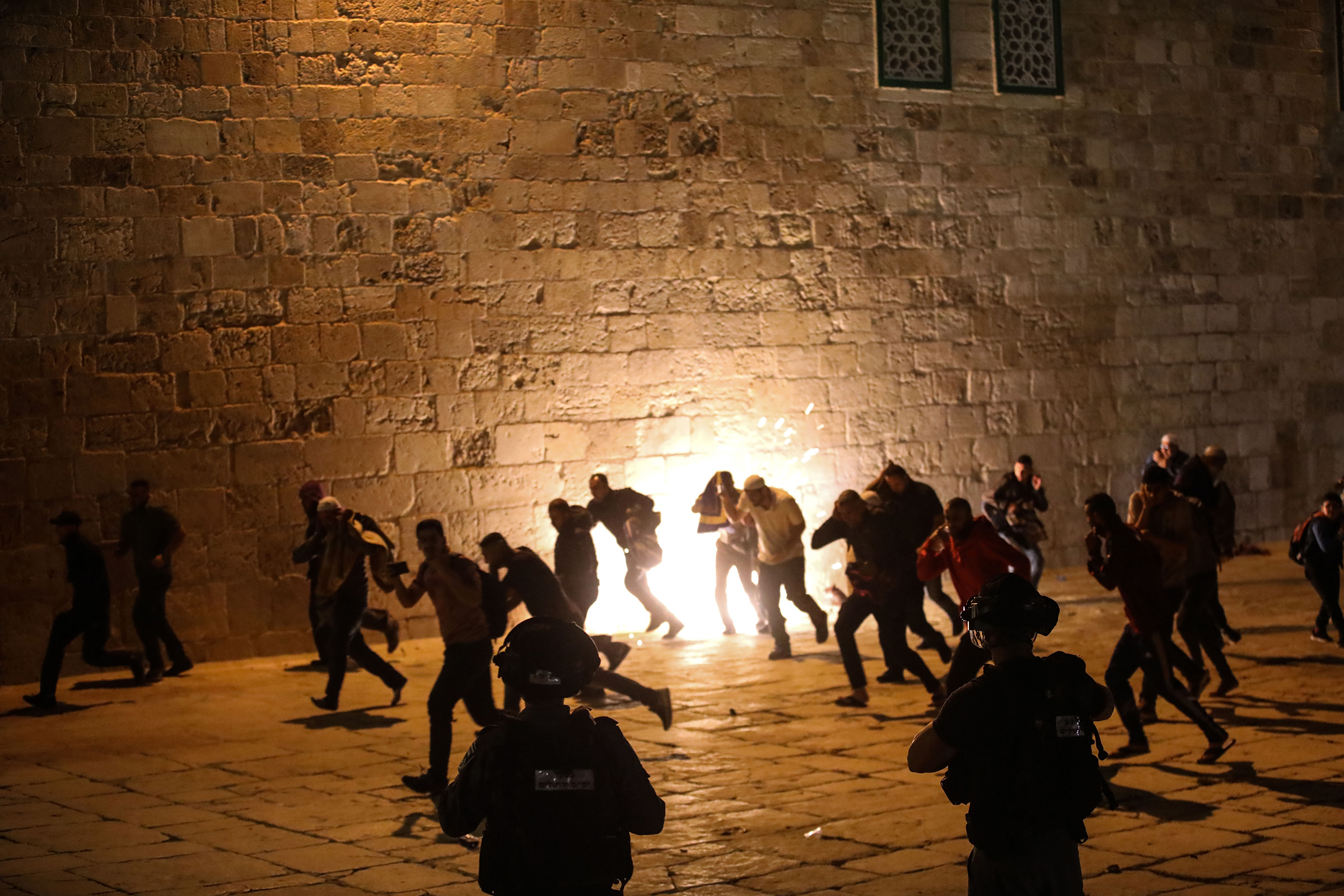Last week, the routine and relatively minor clashes between Israeli security forces and Palestinian protestors took a nasty turn as Israeli police stormed into the Al-Aqsa mosque compound ostensibly to rein in the crowd. But soon the situation escalated, as in response, Hamas fired rockets on several Israeli cities and the Israeli army reacted by pounding the Gaza strip.
Dozens of Palestinians, including many children and women, have been killed in Gaza while six Israelis, including a child, were claimed by Hamas’s rockets. The Islamist Palestinian group, whom the Israelis describe as a terrorist outfit, has so far fired more than a thousand rockets and tried to overwhelm Israel’s iron dome defence system.
The Gazan sky is filled with thick plumes of smoke as Israel targets buildings with Hamas’s commanders and Tel Aviv’s clouds have been pierced by rockets, as people evacuate homes and rush into hiding. On both sides of the fence, residents are terrified but neither Netanyahu’s government nor Hamas is ready to end the conflict that might soon turning into a full-blown war.
“Stop the fire immediately. We’re escalating towards a full-scale war,” warned Tor Wennesland, United Nations Special Coordinator for the Middle East Peace Process. “Leaders on all sides have to take the responsibility of de-escalation. The cost of war in Gaza is devastating & (sic) is being paid by ordinary people. UN is working w/ (sic) all sides to restore calm. Stop the violence now,” he tweeted.
Meanwhile, the International Criminal Court’s Chief Prosecutor, Fatou Bensouda, said she has an eye on the situation for potential war crimes that might be committed. Experts hope her warning acts as a deterrent. “I note with great concern the escalation of violence in the West Bank, including East Jerusalem, as well as in and around Gaza, and the possible commission of crimes under the Rome Statute,” the prosecutor is reported to have said.
After days of violence, there is no end in sight. American President Joe Biden has spoken to Israeli Prime Minister Benjamin Netanyahu and said that he expects the violence to end soon. “My expectation and hope is that this will be closing down sooner than later, but Israel has a right to defend itself when you have thousands of rockets flying into your territory,” said Biden.
But on the ground, the Israeli military says it has the orders to march inside Gaza and will not stop the airstrikes until Hamas gets the message. Lieutenant Colonel Jonathan Conricus, a Spokesperson of the Israeli Defence Forces, told Sky News, a British news channel, that if Hamas stopped firing rockets, the fighting would stop but added that both Hamas and Islamic Jihad had not yet “received the message.”
When Hamas launched rockets on Israel, it was aware that it would have to pay a much higher price, both in terms of casualties and destruction of the already dilapidated Gaza strip. Yet it carried out the attacks, and with force, partly because it would lose all credibility if it did not respond after Al-Aqsa, the third holiest shrine in Islam, became the site of Israeli excesses. But mainly it wanted to show that it was still relevant to the struggle of Palestinians. While some think Hamas proved its worth by the attacks, others say it was suicidal and has brought Palestinians more unwarranted misery and loss of life.
By and large, the world recognised Israel’s right to defend itself from Hamas’s rockets, but in an unequal war—Israel being militarily far superior—the international response seems massively tilted in favour of Israel.
Disproportionate use of force has been a strategy for Israel for a long time and many believe that it has helped Israel survive in a region that has been traditionally hostile to it. Over time, however, Israel has signed peace deals with Jordan and Egypt and, more recently, it inked normalisation deals with the United Arab Emirates, Bahrain, Morocco, and Sudan. It is widely believed that Saudi Arabia, too, is on board the peace ship.
Palestinians, however, feel abandoned by their Arab brethren, especially since the last deals were signed. The broader agreement between experts is that America must facilitate talks between the two sides, renew the peace process, and factor in Palestinian demands if this intractable conflict is to be ever resolved. More rockets and airstrikes will only claim more lives.
Last week, the routine and relatively minor clashes between Israeli security forces and Palestinian protestors took a nasty turn as Israeli police stormed into the Al-Aqsa mosque compound ostensibly to rein in the crowd. But soon the situation escalated, as in response, Hamas fired rockets on several Israeli cities and the Israeli army reacted by pounding the Gaza strip.
Dozens of Palestinians, including many children and women, have been killed in Gaza while six Israelis, including a child, were claimed by Hamas’s rockets. The Islamist Palestinian group, whom the Israelis describe as a terrorist outfit, has so far fired more than a thousand rockets and tried to overwhelm Israel’s iron dome defence system.
The Gazan sky is filled with thick plumes of smoke as Israel targets buildings with Hamas’s commanders and Tel Aviv’s clouds have been pierced by rockets, as people evacuate homes and rush into hiding. On both sides of the fence, residents are terrified but neither Netanyahu’s government nor Hamas is ready to end the conflict that might soon turning into a full-blown war.
“Stop the fire immediately. We’re escalating towards a full-scale war,” warned Tor Wennesland, United Nations Special Coordinator for the Middle East Peace Process. “Leaders on all sides have to take the responsibility of de-escalation. The cost of war in Gaza is devastating & (sic) is being paid by ordinary people. UN is working w/ (sic) all sides to restore calm. Stop the violence now,” he tweeted.
Meanwhile, the International Criminal Court’s Chief Prosecutor, Fatou Bensouda, said she has an eye on the situation for potential war crimes that might be committed. Experts hope her warning acts as a deterrent. “I note with great concern the escalation of violence in the West Bank, including East Jerusalem, as well as in and around Gaza, and the possible commission of crimes under the Rome Statute,” the prosecutor is reported to have said.
After days of violence, there is no end in sight. American President Joe Biden has spoken to Israeli Prime Minister Benjamin Netanyahu and said that he expects the violence to end soon. “My expectation and hope is that this will be closing down sooner than later, but Israel has a right to defend itself when you have thousands of rockets flying into your territory,” said Biden.
But on the ground, the Israeli military says it has the orders to march inside Gaza and will not stop the airstrikes until Hamas gets the message. Lieutenant Colonel Jonathan Conricus, a Spokesperson of the Israeli Defence Forces, told Sky News, a British news channel, that if Hamas stopped firing rockets, the fighting would stop but added that both Hamas and Islamic Jihad had not yet “received the message.”
When Hamas launched rockets on Israel, it was aware that it would have to pay a much higher price, both in terms of casualties and destruction of the already dilapidated Gaza strip. Yet it carried out the attacks, and with force, partly because it would lose all credibility if it did not respond after Al-Aqsa, the third holiest shrine in Islam, became the site of Israeli excesses. But mainly it wanted to show that it was still relevant to the struggle of Palestinians. While some think Hamas proved its worth by the attacks, others say it was suicidal and has brought Palestinians more unwarranted misery and loss of life.
By and large, the world recognised Israel’s right to defend itself from Hamas’s rockets, but in an unequal war—Israel being militarily far superior—the international response seems massively tilted in favour of Israel.
Disproportionate use of force has been a strategy for Israel for a long time and many believe that it has helped Israel survive in a region that has been traditionally hostile to it. Over time, however, Israel has signed peace deals with Jordan and Egypt and, more recently, it inked normalisation deals with the United Arab Emirates, Bahrain, Morocco, and Sudan. It is widely believed that Saudi Arabia, too, is on board the peace ship.
Palestinians, however, feel abandoned by their Arab brethren, especially since the last deals were signed. The broader agreement between experts is that America must facilitate talks between the two sides, renew the peace process, and factor in Palestinian demands if this intractable conflict is to be ever resolved. More rockets and airstrikes will only claim more lives.
By Anchal Vohra
Source: Observer Research Foundation



